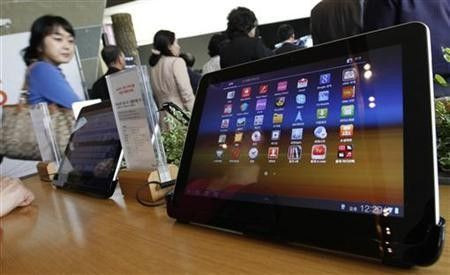Samsung wins a round in long legal fight with Apple

Samsung Electronics Co won a round of its bruising global patent fight with Apple Inc on Friday when an Australian court lifted a ban on the sale of its Galaxy tablet computer in time for the busy Christmas shopping season.
But the South Korean firm's triumph in a Sydney courtroom was tempered by a setback the previous day in Paris, where another court rejected its bid to block sales of Apple's iPhone 4S in France.
Apple and Samsung have been embroiled in some 30 legal cases in 10 countries since April, as they jostle for the top spot in the booming smartphone and tablet markets.
The Australian High Court ruling allows Samsung to offer the device to Australian shoppers for the final weeks of the key Christmas shopping season and came a week after a U.S. court denied Apple's plea to ban Galaxy phones and tablets in the country.
Apple on Thursday appealed against the U.S. decision, which deprived the iPhone and iPad maker of crucial leverage.
In France, Samsung's bid to impose a preliminary sales ban on the iPhone 4S was rejected. Calling the request out of proportion, the court also ordered Samsung to pay 100,000 euros ($133,900) of Apple's legal fees, according to the decision.
Samsung said on Friday it would review the written grounds for the French ruling and continue to exercise all available options to assert its intellectual property rights.
Apple first sued Samsung in the United States in April, saying the firm's smartphones and tablets slavishly copied its iPhone and iPad.
Samsung shot back, suing Apple for infringing on its telecommunications technology, and later expanded its suit to include Apple's iPhone 4S, released in October.
The South Korean firm filed preliminary injunction motions against the iPhone 4S in Japan, France, Italy and Australia in October.
In Australia, sales of iPhone 4S are allowed to continue after a court agreed to hear a patent infringement case brought by Samsung in March.
If the Italian bid (by Samsung) also fails, the time may come for both Apple and Samsung to realise that you can't win a marathon with a sprint, said intellectual property expert Florian Mueller.
The problem with those 'sprints' -- in terms of requests for preliminary injunctions that courts can grant after a fast-track proceeding -- is that when they fail, they do nothing to enhance the credibility of the respective plaintiff.
SALES RESUME AFTER NEARLY 5-MONTH ABSENCE
Samsung's Galaxy tablet 10.1, which is considered one of the main alternatives to Apple's iPad, has been kept out of the Australian market since late July.
The Australian market, while not huge, is the first launch market for Apple products outside the United States.
In late November, Samsung won a rare legal victory after an Australian Federal Court unanimously decided to lift a preliminary injunction, imposed by a lower court, on sales of Samsung's Galaxy Tab 10.1.
Apple had appealed against the decision in the High Court, which is the final court of appeal. Apple could not be reached for comment immediately.
Samsung is the world's top smartphone maker, but a distant second to Apple in tablets.
The quarrel has triggered expectations that some of the pair's $5 billion-plus relationship may be up for grabs. Samsung counts Apple as its biggest customer and makes parts central to Apple's mobile devices.
Global tablet sales are expected to explode to more than 50 million in 2011. Apple, which has sold more than 30 million iPads so far, is expected to continue to dominate the market in the near term.
Now Amazon.com has also entered the fray with its Kindle Fire tablet, but Samsung's Galaxy line-up is widely deemed the closest rival in terms of capability and design to the iPad.
Shares in Samsung fell 0.4 percent by 0355 GMT versus a 1.8 percent drop in the wider market.
© Copyright Thomson Reuters 2024. All rights reserved.





















